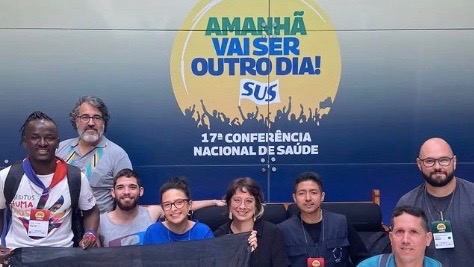The 17th National Health Conference, taking place in Brasilia between July 2 and 5, welcomed a delegation of migrants for the first time in its history. The five delegates were elected at the Open National Conference on the Health of Migrant Populations, which took place in May year and was attended—virtually and physically—by 876 people from 19 cities in 12 States and the Federal District of Brazil.
The discussions about the health of migrant populations resulted in four guidelines and 20 proposals for the Unified Health System (SUS). These were sent to the National Health Council for integration into the agenda of the 17th National Health Conference and for presentation by the migrant delegates during the conference. The National Health Conferences are spaces for dialogue between government and civil society, where citizens can contribute to the planning, implementation, and evaluation of government activities, specifically in the SUS.
This mobilizations and discussions for a migrant health policy aim to establish a Health Care Policy for Migrant Populations in the country. It involves organizing a movement of migrants and supporters to create a national strategy that ensures specific healthcare for this group, which is an unprecedented effort.
Read | Over 4.000 delegates gather to discuss future of Brazil’s iconic health system
It all started with a series of preparatory activities before the Health Conferences that took place in 2023. In 2021, Brazil held its first National Plenary on Health and Migration. The goal was to establish guidelines for equity in the SUS regarding migrants and propose new public policies. With time, the national stage laid the foundations for the constitution of a National Front for Migrant Health (FENAMI).
For a health care policy for migrant populations
The SUS relies not only on universality, but also equity. To guarantee the universal character of the health system, the government has to consider the inequalities of Brazilian society, such as linguistic, cultural, ethno-racial, and other issues.
According to Alexandre Branco-Pereira from FENAMI, the movement that led to the election of the migrant delegates to the National Health Conference has two main objectives. 1) To make possible a wide mobilization among migrant communities, so that they are actively involved in the struggles for health. 2) The establishment of a resilient national policy that is resistant to political turbulence and changes of government.
Previously, some policies promoting the health of migrant populations have been established in a decentralized way in municipalities and States. However, experience has shown that these plans can be fragile and face the risk of being discontinued and weakened in cases where administrations change. The city of São Paulo, for example, introduced a policy in 2016, but it gradually went unsupported.
Ministry of Health’s working group on migration has limitations
Last month, the Ministry of Health created a working group (WG) to develop the National Health Policy for Migrant, Refugee and Stateless Populations, under the coordination of the Health Surveillance and Environment Secretariat (SVSA). The group will initially have one year to complete its activities, and will be composed of members of the Ministry, with the possibility of participation of representatives from other federal levels, foreign governments, public and private agencies and entities, non-governmental organizations, and experts.
The constitution of the working group was sparked by a demand from the migrant movements in the country, through official requests to the Ministry and political coordination. It is a victory for these movements, as well as an important sign that the ministry is edging towards the creation of a policy. However, according to Alexandre Branco-Pereira, the document that established the working group has certain flaws that could easily compromise the process.
The WG does not include a unified platform for social participation, which is also a fundamental principle of the SUS. Representatives of the migrant population can only participate in the working group if they are invited by the coordination. There is no provision for their full participation or representation. This flaw is significant as it compromises the transparency and quality of work. The participation of civil society is not only a right, but also essential for ensuring that important aspects of the policy are addressed.
It is also worrisome that the working group is under the coordination of SVSA. The history of Brazil and the world has shown that when we focus solely on surveillance in work with migrant populations, there is a danger of treating them as potential disease carriers or epidemiological threats. This perspective contradicts the goal of protecting their rights, which should be the focus of the policy which is being developed. The COVID-19 pandemic has highlighted discriminatory consequences resulting from such associations, such as the linking of the virus to Chinese people or the restrictions on travel of Brazilians due to the variant found in the Amazon region.
FENAMI has requested the Ministry of Health to clarify the reasons behind these issues, and has already communicated concerns about the establishment of the working group at the SVSA.
People’s Health Dispatch is a fortnightly bulletin published by the People’s Health Movement and Peoples Dispatch. For more articles and to subscribe to People’s Health Dispatch, click here





